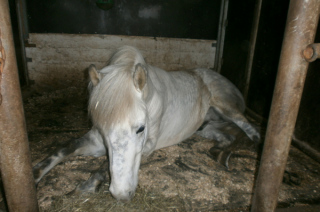Oct 05 2014
1 Comment
Is Fluoride Hurting Iceland’s Farm Animals?
Al Jazeera
Some farmers suspect fluoride from aluminium smelters is making animals sick, but the companies sharply disagree.
Reykjavik, Iceland – For the third summer in a row, hydrogen fluoride has been detected in vegetation samples taken near an aluminium plant in eastern Iceland, worrying farmers and horse owners who fear for their animals’ well-being.
Aluminium plants emit fluoride, a chemical element that can be toxic to animals and humans in high concentrations.
The Environment Agency of Iceland found the concentration of fluoride in grass grazed by sheep exceeded the recommended limits near the town of Reydarfjordur.
Sigridur Kristjansdottir from the Environment Agency told Al Jazeera the high levels this summer were “primarily due to meteorological and geographical factors … This resulted in the results for early June showing relatively high values”.
A press release issued by the Alcoa Fjardaal aluminium plant noted that, despite the spike this summer, average fluoride levels this year are lower than they were in 2013, which in turn were lower than in 2012.
Fluoride is a cumulative poison, meaning that animals and plants often register higher levels of the element as they age. Before the Fjardaal aluminium smelter began operation, the fluoride level in Sigurdur Baldursson’s sheep – who live on the only farm near Alcoa’s plant – were measured as having 800 micrograms per gram (µg/g) of fluoride in their bone ash. That’s well below the recommended limit of 4,000 µg/g in the bone ash of adult sheep, or 2,000 µg/g for lambs.
But samples taken in 2013, recorded the sheep’s fluoride levels between 3,300 and 4,000 µg/g. Baldursson said he expects the next readings to exceed 5,000 µg/g – above the recommended limit.
“The sheep that will be sampled next were born in 2007, and are thus as old as the aluminium plant itself,” he told Al Jazeera.
Nevertheless, Baldursson said he has not noticed signs of ill health in his sheep.
‘I only heard about it by accident’
Bergthora Andresdottir sees things differently from her farm on the other side of Iceland, 25km north of the capital Reykjavik. She said she is constantly phoning the Environment Agency to complain about smoke rising from Century Aluminium’s smelter at Grundartangi, directly across the fjord from her farm.
“I phone them several times a week,” she told Al Jazeera. “But there’s no specific person to talk to, and they don’t help much. Sometimes they claim that the smoke is coming from the neighbouring factory [the Elkem ferrosilicon smelter], but I tell them it isn’t.”
In August 2006, an accident at the Grundartangi plant caused a large amount of fluoride emissions. Riding school owner Ragnheidur Thorgrimsdottir said local farmers were never told about this accident, which meant that sheep, cattle and horses ate fluoride-contaminated grass. “I only heard about it by accident, two years later,” she told Al Jazeera.
That same year, the capacity of the Century plant was increased from 90,000 tonnes of aluminium a year to 220,000. The firm HRV Engineering stated “the increase in fluoride for the autumn months of 2006 in the atmosphere … can partly be traced to the increase in capacity of the smelter”.
Sick horses
Thorgrimsdottir lives about five kilometres southwest of the Grundartangi plant, and owns 20 horses – which she said have been badly affected by fluoride, some so badly that they have had to be put down.
“This is the eighth year in a row that my horses have been sick. Currently three of them are sick, but I’m also keeping an eye on four more,” she told Al Jazeera. Instead of keeping her horses outside all the time, as is the norm during Icelandic summers, she has kept them in at night and given them hay to eat because they do not digest grass properly.
Thorgrimsdottir showed Al Jazeera one of the affected horses named Silfursteinn. “The affected horses walk stiffly, like sticks. They also tend to have lumps and swellings on their bodies,” said Thorgrimsdottir. Read More
